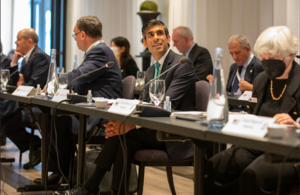G7 Finance Ministers agree to work together to address global supply chain pressures
The Chancellor has welcomed an agreement from G7 Finance Ministers to work together to monitor supply chain pressures as the global economy rebounds from the pandemic.

- During a meeting hosted by Chancellor Rishi Sunak in Washington DC, G7 Finance Ministers and Central Bank Governors have agreed to work together to monitor global supply chain pressures.
- Rishi Sunak also announced that the UK will commit over £1 billion worth of Special Drawing Rights to support vulnerable countries, and gives its backing to a new IMF Trust to help developing countries support green and sustainable economies.
- G7 Finance Ministers and Central Bank Governors also launch a report setting out public policy principles for issuing central bank digital currencies, a digital version of money that if introduced could be used alongside physical notes and coins.
Charing a meeting of G7 Finance Ministers and Central Bank Governors in Washington DC on Wednesday (13 October), Rishi Sunak stressed the importance of global co-operation to ensure that supply chains are more resilient as the world emerges from the pandemic.
This builds on action being taken at home to ease the supply chain issues through temporary visas and support for businesses as they transition towards a high-skill, high-wage economy through skills bootcamps and the Government’s 130% super-deduction for capital investment.
Following the meeting, Chancellor Rishi Sunak said:
Supply chain issues are being felt globally – and finance leaders from around the globe must collaborate to address our shared challenges.
Today we have collectively agreed to work closely over the coming months – and together we will build a strong and resilient recovery.
Support for vulnerable countries
During the meeting on Wednesday (13 October), the Chancellor also announced that the UK is pledging an additional loan of over £1bn worth of Special Drawing Rights (SDRs) to the IMF’s Poverty Reduction and Growth Trust (PRGT) and called on other countries to do the same. The PGRT provides zero interest loans to vulnerable countries who need financial support.
Weeks ahead of the COP26 conference in Glasgow, the UK has also given its backing to the IMF’s proposed Resilience and Sustainability Trust and called on global counterparts to do the same. This trust would redirect SDR reserves to low-income and vulnerable middle-income countries to help them address health and climate risks and support green and sustainable economic growth.
Central Bank Digital Currencies
Under the leadership of the UK, G7 Finance Ministers and Central Bank Governors also launched a set of public policy principles for retail Central Bank Digital Currencies (CBDCs), which if introduced could be a digital form of central bank money that would be used alongside physical notes and coins. This report will help support and inform exploration of CBDCs and provides an important contribution to the global policy conversation.
Carbon pricing
Today the G7 also agreed, for the first time, to work together to consider how best to coordinate efforts on the pricing of carbon to mitigate emissions, and to explore international solutions to prevent carbon leakage, helping us deliver the transformational change required by the Paris Agreement.
Further information:
- Details about the Poverty Reduction and Growth Trust.
- Read the G7 agreed Central Bank Digital Currencies report and statement.
- While no G7 authority has yet chosen to issue a CBDC, these principles will help in designing and potentially delivering a CBDC that would be fit for the future.
- The Special Drawing Right (SDR) is an international reserve asset created by the IMF to supplement other reserve assets of member countries.
- The UK has this week committed to channel around 20% of its new allocation of Special Drawing Rights at a value of around £4bn, out of which the UK will loan 1bn Special Drawing Rights to the Poverty Reduction and Growth Trust.
- These loans will be provided at a concessional interest rate, which is also expected to provide the equivalent of a further SDR 100m in implicit grant resources.
- Carbon leakage is the displacement of production, and associated greenhouse gas emissions, in ways that would not have happened if the pricing (or regulation) of emissions across jurisdictions was implemented in an equivalent way.
- The G7 will work together to better understand the macroeconomic consequences of the different possible paths to net zero.